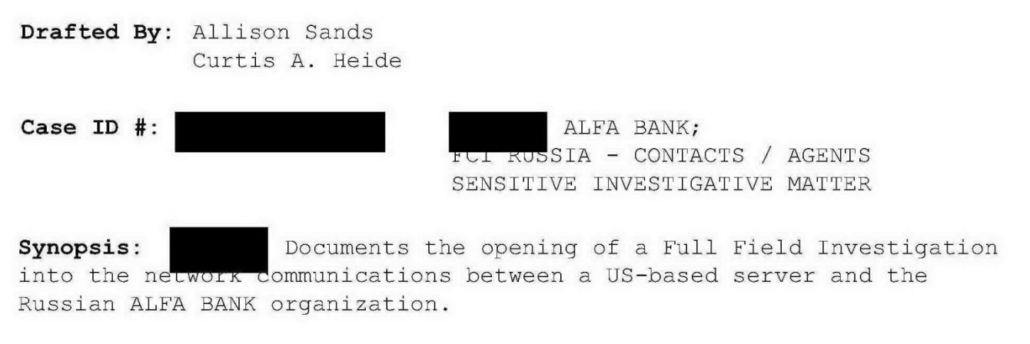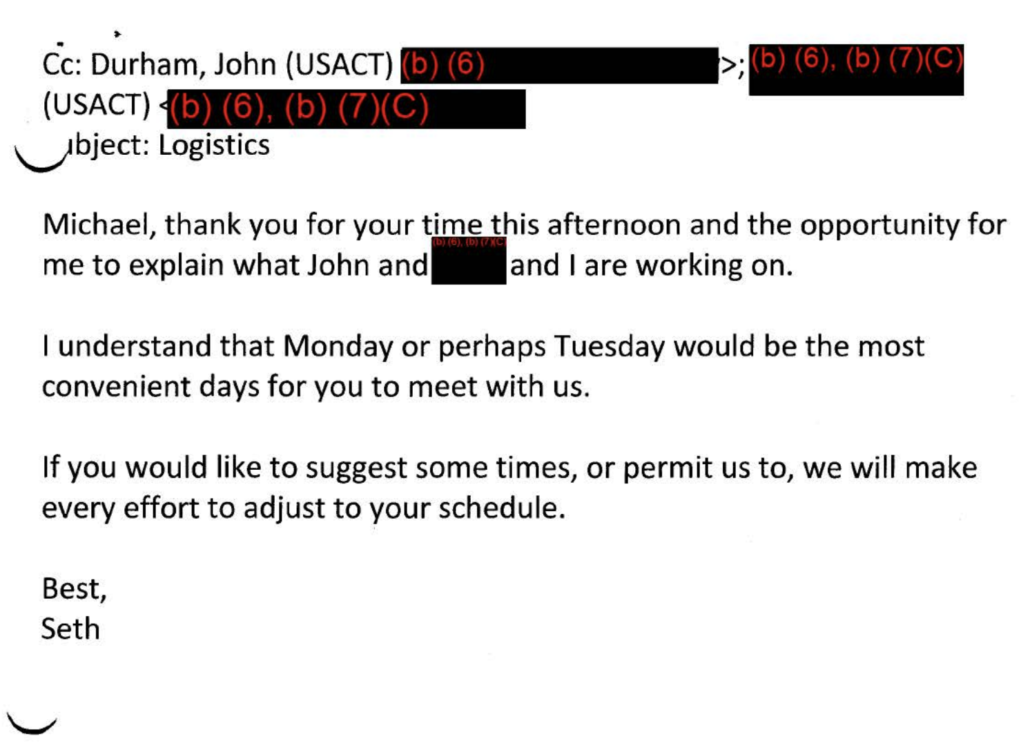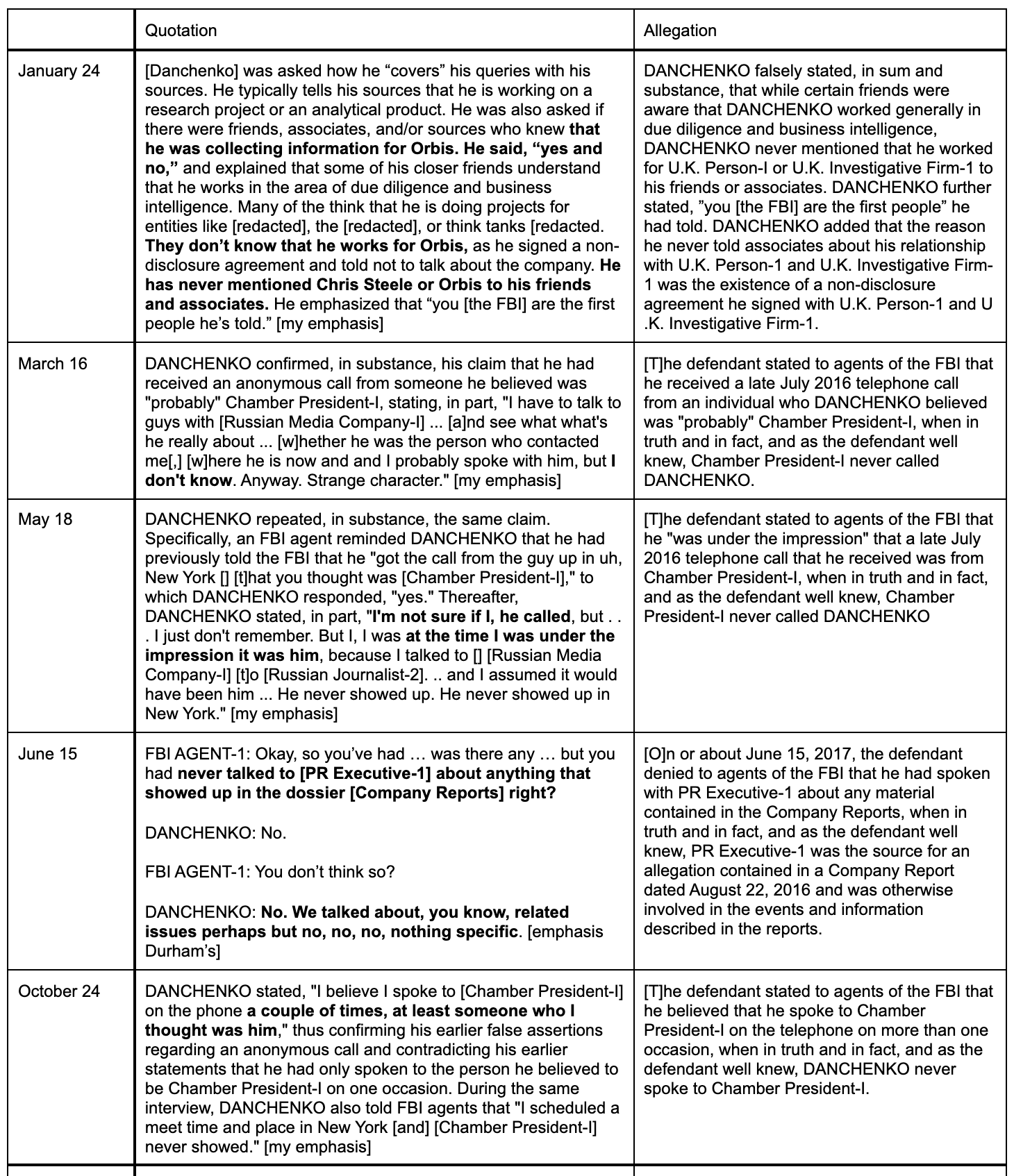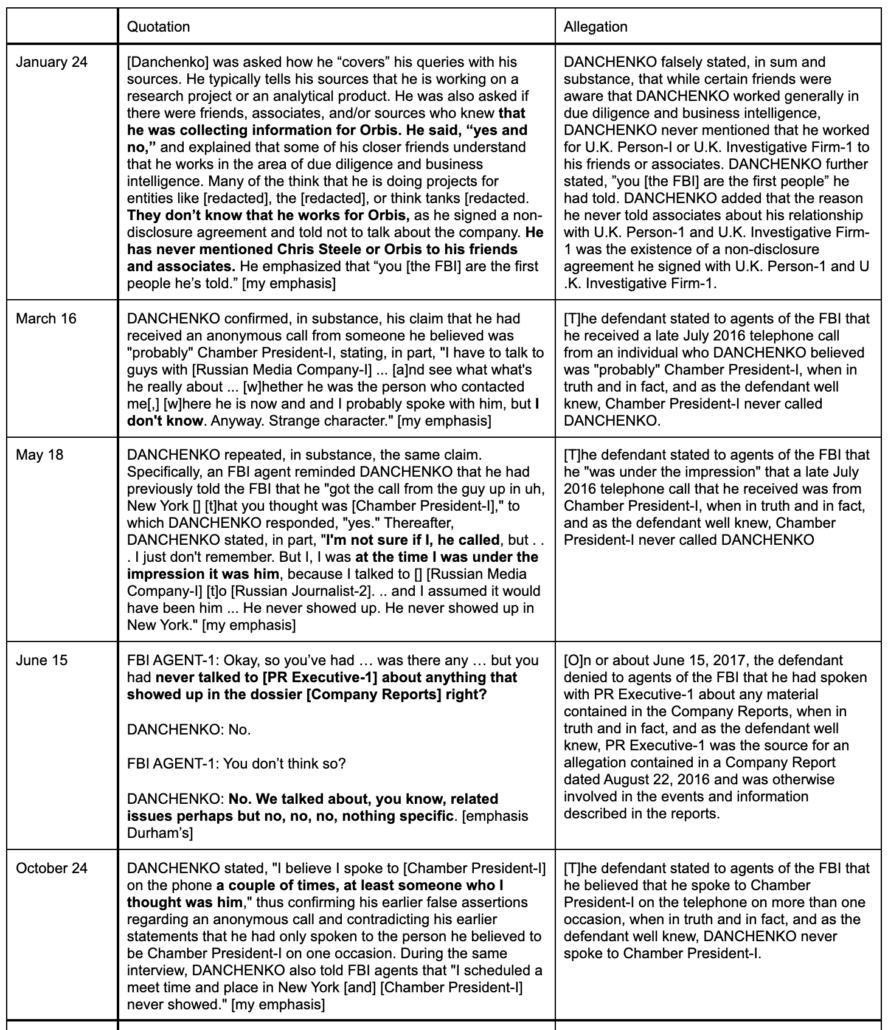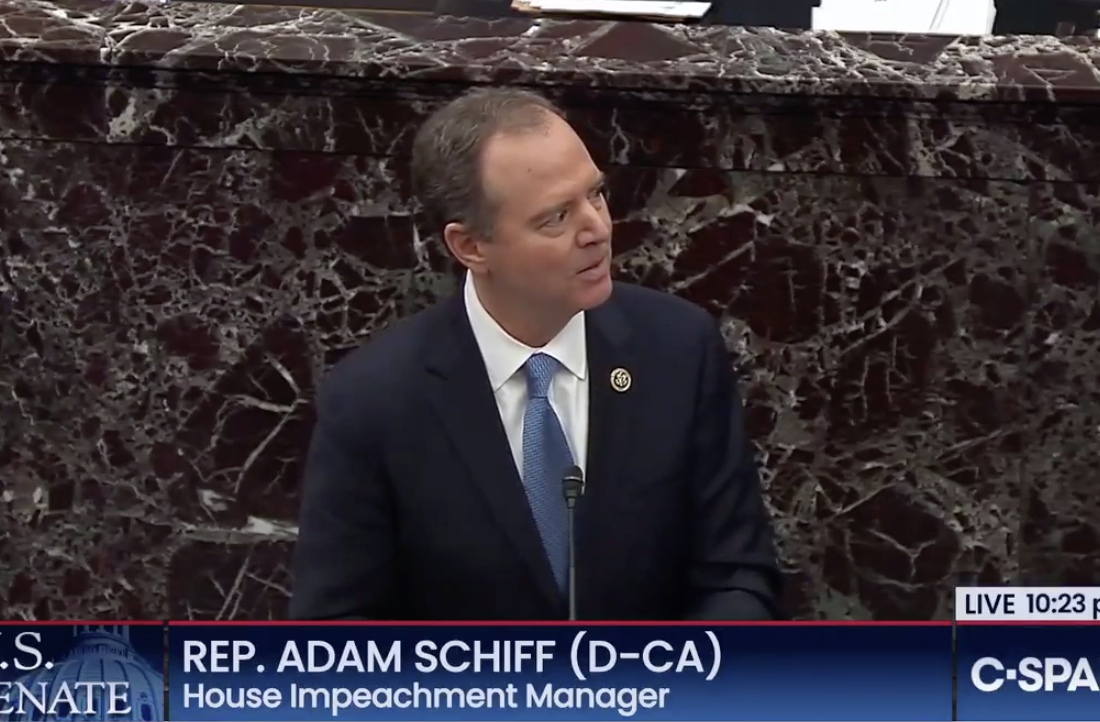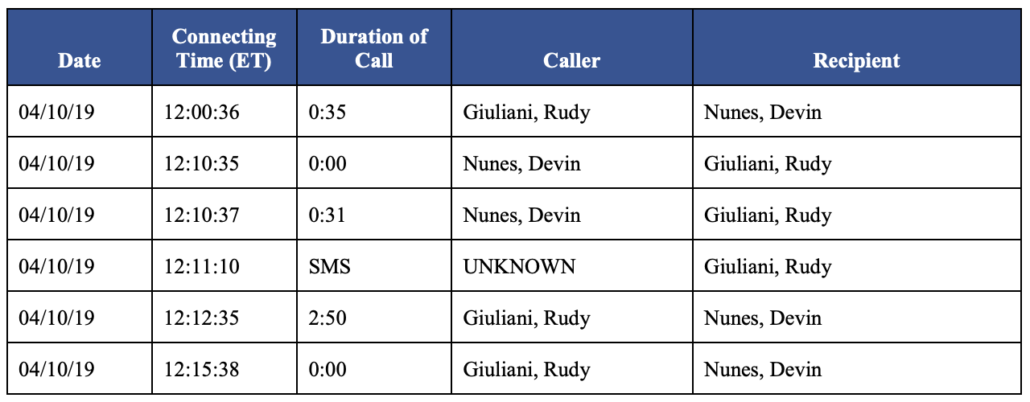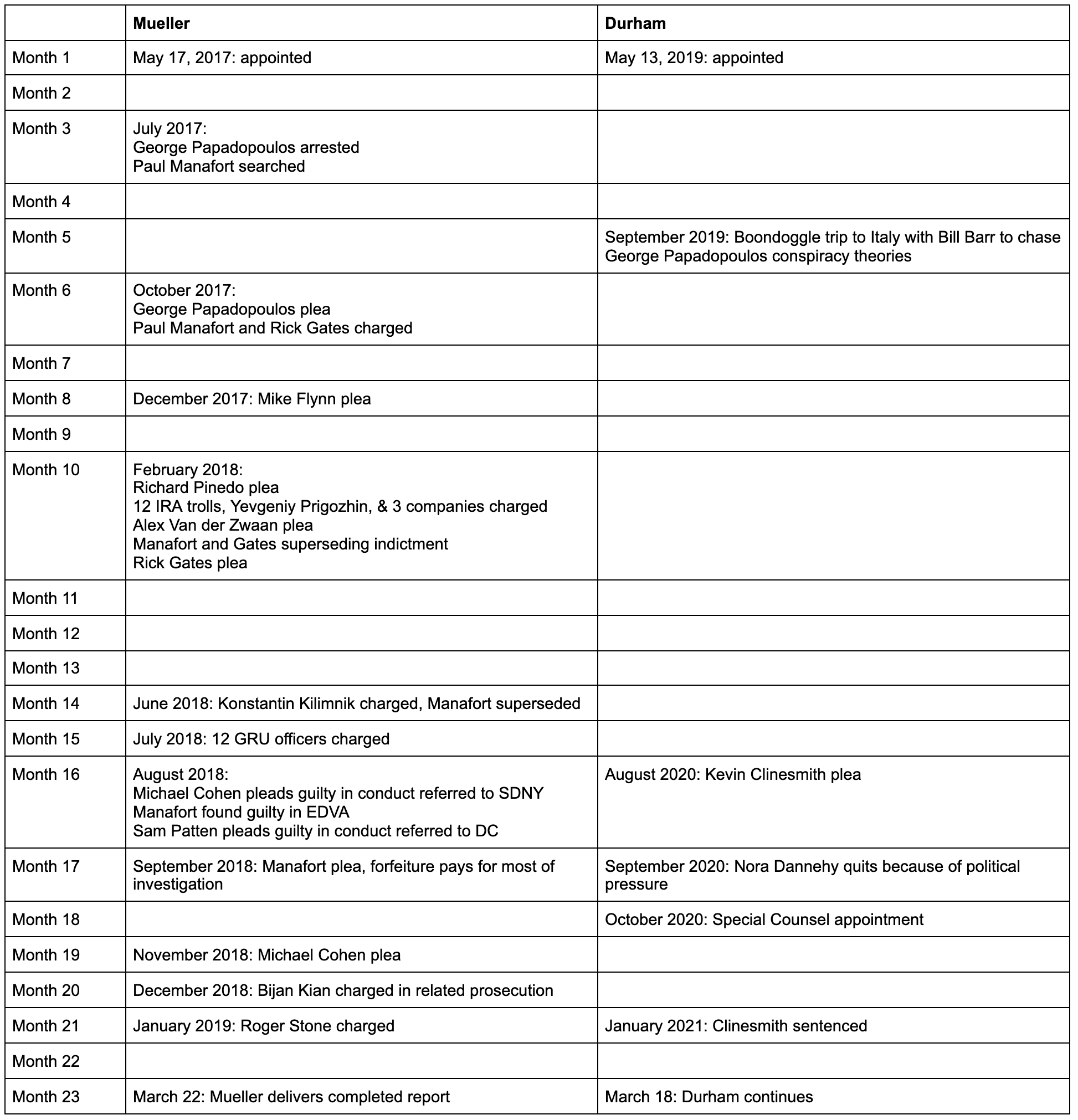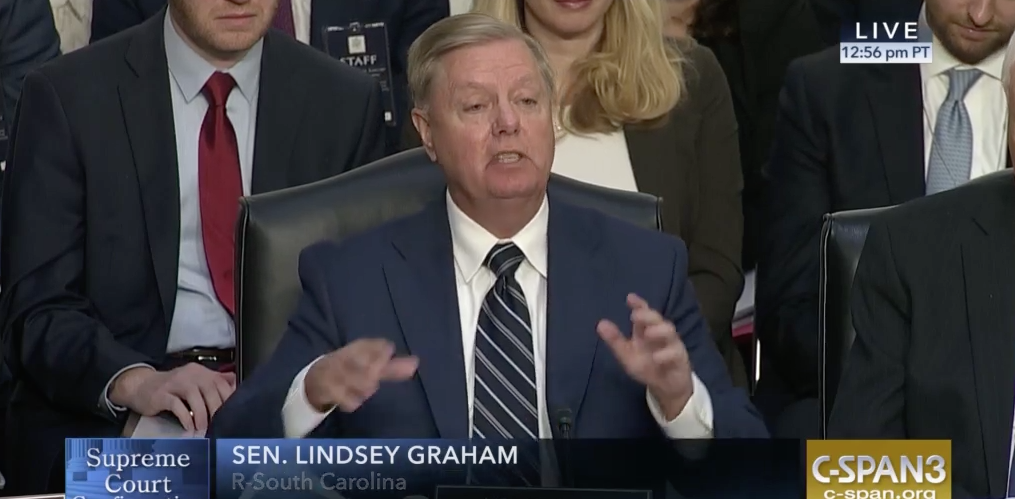The Seth DuCharme Confession in the Charles McGonigal Sentencing Memo
In his sentencing memo for Charles McGonigal’s DC case, former Bill Barr flunky Seth DuCharme twice misstated the nature of the false statement for which Kevin Clinesmith was sentenced.
In a passage comparing other government officials who had omitted information from government filings, as McGonigal pled he had, DuCharme asserted that Clinesmith was prosecuted for making “false statements,” plural, “in application for” FISA warrant.
United States v. Clinesmith, No. 1:20-cr-165 (D.D.C. 2020) (imposing probation against FBI attorney for false statements in application for a Foreign Intelligence Surveillance Act (“FISA”) warrant); [my emphasis]
Even before that, in arguing that Judge Colleen Kollar-Kotelly should not apply a sentencing enhancement, he turned to Clinesmith. This time, he accused Clinesmith of causing false information to be submitted to FISC.
Mr. McGonigal disagrees with the application of the cross reference in Section 2B1.1(c)(3), which would increase his base offense level to 14, as inconsistent with case precedent. In United States v. Clinesmith, No. 1:20-cr-165 (D.D.C. 2020), the government did not seek and the sentencing court did not independently apply the cross reference to the obstruction Guideline at the sentencing of an FBI attorney who caused false information to be submitted to the U.S. Foreign Intelligence Surveillance Court (“FISC”) in an application for a Foreign Intelligence Surveillance Act (“FISA”) warrant sought in connection with an active FBI investigation. The government’s position that false statements to the FISC during an active investigation does not warrant application of the cross reference while Mr. McGonigal’s conduct does is perplexing. While Mr. McGonigal concedes that this Court in United States v. Hawkins, 185 F. Supp. 3d 114 (D.D.C. 2016) held that it may consider conduct in the statement of the offense, and the court in United States v. Saffarinia, 424 F. Supp. 3d 46 (D.D.C. 2020) held that at the motion to dismiss phase Section 1519 is broad enough to cover false statements on OGE-278 forms, it is difficult to reconcile these cases with the Clinesmith court’s more recent analysis. In Clinesmith, the District Court declined to apply the obstruction cross reference in determining the applicable Guidelines range, and we respectfully request that this Court similarly decline to apply the cross reference to the facts at issue here. [my emphasis]
Kevin Clinesmith altered an email and with it, misled a colleague, thereby preventing the FBI from fully informing the FISA Court on something material to the application. In that, he “caused” information not to be shared with the FISC. He did not make false statements in the application (and in any case, the original decision not to notify the court that Page had years earlier shared information with the CIA about Russian spies, which Clinesmith had no part of, had in significant part to do the the fact that Page had not been an approved contact of the CIA for several years before 2016, when he went out of his way to contact the Russians about his role in a counterintelligence investigation). Nor did Clinesmith cause affirmative false statements to be made.
His was a crime of omission, not commission, as DuCharme claimed. I emailed DuCharme about the basis for these claims but got no response.
More importantly, whether you agree with him or not, Judge James Boasberg explained why he sentenced Clinesmith to probation: because he didn’t think Clinesmith believed he was lying and the former FBI lawyer got no benefit from his false claim.
First, he obtained no real personal benefit from his actions and he had no active intent to harm.
Although the government has contested this, my view of the evidence is that Mr. Clinesmith likely believed that what he said about Dr. Page was true, namely that he was a subsource but not a source of the Other Government Agency. By altering the e-mail, he was saving himself some work and taking an inappropriate shortcut. But I do not believe that he was attempting to achieve an end he knew was wrong.
I’m on the record saying Clinesmith should have gotten some jail time, even in spite of the wildly unsubstantiated claims Durham’s team made about politicization. I think DuCharme is totally right to compare how lenient courts have been with government officials who fail to disclose things, including by invoking the Clinesmith sentence. That’s all sound lawyering.
But his sloppy treatment of Clinesmith — the appointment of John Durham to prosecute for which DuCharme played a central role — comes off as petulant and partisan. Indeed, Barr’s office took personal interest in this prosecution all the way through the time DuCharme swapped back to EDNY, as revealed by a text exchange Barr had with his Chief of Staff, probably complaining that Boasberg remained on this case, after the plea deal.
There are few factual similarities to the two cases, and by focusing so much on him, DuCharme seems to be saying, “if Kevin Clinesmith didn’t have to go to jail based on our conspiracy theories about him, my guy shouldn’t have to either.”
All the more so given another enhancement argument DuCharme made. He argues that a 3-level enhancement should not be applied because McGonigal trumped up a FARA investigation into the rival of the Albanian paying him to travel around Europe, the thing he failed to disclose.
Mr. McGonigal further disagrees with the application of Section 2J1.2(b)(2) resulting in a three-level enhancement for “substantial interference” with the administration of justice. According to the PSR, the enhancement is applied to Mr. McGonigal because he admitted to “speaking with a foreign official about a matter in which Person A had a financial interest, and opening a criminal investigation based on information provided to him by Person A.” PSR ¶ 57. While the enhancement is appropriately applied to the “premature or improper termination of a felony investigation,” we are aware of no authority supporting its application to the opening of a felony investigation, as is the case here. 7 As Special Agent in Charge (“SAC”) of Counterintelligence for the New York Field Office, it was Mr. McGonigal’s job to pass along information he received that could be indicative of criminal activity. Had Mr. McGonigal taken the alternative route and concealed or withheld the information he received from Person A concerning potential criminal activity in the United States, that would be troubling. Instead, he passed the tip and lead to the FBI, to be appropriately vetted by the Bureau and the U.S. Attorney’s Office. Accordingly, the application of Section 2J1.2(b)(2) is unwarranted.
7 U.S.S.G. § 2J1.2 (“Substantial interference with the administration of justice” means “a premature or improper termination of a felony investigation; an indictment, verdict, or any judicial determination based upon perjury, false testimony, or other false evidence; or the unnecessary expenditure of substantial governmental or court resources.”); see e.g., United States v. Baker, 82 F.3d 273 (8th Cir 1996) (applying enhancement to police officer who improperly terminated a felony investigation). [my bold, italics original]
The technical issue — whether this enhancement can be used because someone initiated an improper investigation rather than improperly ending one — will make an interesting appeal if Kollar-Kotelly applies the enhancement and and sentences McGonigal to serve his sentence concurrent to the 50-month sentence Judge Jennifer Rearden gave McGonigal for trying to trump up sanctions against an Oleg Deripaska rival in SDNY, something DOJ is not requesting. But it’s likely that would be unsuccessful: As the government notes in its sentencing memo and even the footnote here makes clear, after the termination language DuCharme focuses on, the guideline continues, “or the unnecessary expenditure of substantial governmental or court resources.” And McGonigal’s opening an investigation against his business partner’s rival used counterintelligence resources that should have been spent on more serious threats.
FBI officials even questioned the propriety of opening up the criminal investigation at the time it was initiated, but cited the defendant’s directive. See Ex. 1 at 1.
[snip]
Here, initiating the investigation based on Person A’s information was particularly egregious given its lack of substantiation, which is why it was promptly closed following the defendant’s retirement.
DOJ provided records showing that one of McGonigal’s colleagues was genuinely troubled about the propriety of opening a FARA case against someone who had already registered under FARA regarding a country, Albania, that isn’t among the countries of priority for such things. By opening an investigation into a lobbyist for an Albanian political party (reportedly former Ted Cruz Chief of Staff Nicholas Muzin), McGonigal was drawing resources away from more pressing threats.
So my question is with all the talk of shortage of resources and most field offices having difficulty covering Band 3 and 4 threats, and FARA cases from banded threat countries rarely prosecuted by DOJ, why is NY requesting a SIM FAR investigation be opened on Albania for an improper FARA registration as a threat to national security?
I of course will fully support anything NY wants to do in their AOR, but once the paperwork to restrict the case gets reported up my chain of command, I would like to be able to explain to them why we are working an Albanian SIM/FARA case when every day I am in there fighting for resources on some national security matters pertaining to banded countries such as [redacted]. I am assuming since this directive is coming from SAC McGonigal there is more to this story?
Per those records, McGonigal appears to have caused a politically connected Republican to have nine of his bank accounts scrutinized before the investigation got closed. The Albanian section of Oversight Democrats’ report on Trump’s acceptance of emoluments provides more background on the political wranglings involved; Albanian Prime Minister Edi Rama and two aides spent almost $3,500 at Trump’s hotel on a trip when they met with McGonigal.
Notably, the investigation against this lobbyist, like Crossfire Hurricane, was opened as a Full investigation from the start.
And after the FBI discovered that McGonigal had opened up an investigation to help his business partner, the FBI has had to review all the other cases he was working on to make sure he hadn’t similarly used criminal investigations for self-interested purposes.
Moreover, given the defendant’s senior and sensitive role in the organization, the FBI has been forced to undertake substantial reviews of numerous other investigations to insure that none were compromised during the defendant’s tenure as an FBI special agent and supervisory special agent. The defendant worked on some of the most sensitive and significant matters handled by the FBI. PSR ¶¶ 98-101. His lack of credibility, as revealed by his conduct underlying his offense of conviction, could jeopardize them all. The resulting internal review has been a large undertaking, requiring an unnecessary expenditure of substantial governmental resources.
The misrepresentation of the Clinesmith plea might be reasonable coming from someone else. Like all criminal defendants, McGonigal deserves zealous advocacy.
But this argument came from Seth DuCharme.
It came from someone who opened a four year follow-on investigation in which the only crime ever identified was that Clinesmith alteration — and that crime was discovered by someone else, and could easily have been, and should have been, prosecuted by the very same prosecutors who did prosecute it, only instead reporting to the Trump appointed US Attorney in DC rather than Durham. And among the prosecutions pursued as part of that four year investigation that Seth DuCharme opened was a false statements case against Michael Sussmann based off logic directly contrary to what DuCharme argues here, that McGonigal would have failed to do his duty if he hadn’t opened the investigation into his business partner’s rival. That logic, applied to the Durham investigation, says it would have been remiss not to investigate the Alfa Bank allegations that Sussmann shared with Jim Baker — which is exactly what Sussmann said from the start.
Worse still, that argument DuCharme makes, that, “it was Mr. McGonigal’s job to pass along information he received that could be indicative of criminal activity,” is precisely the argument that Bill Barr made to explain a similar laundering of self-interested information that Seth DuCharme effected: the channeling of information from Rudy Giuliani to the Hunter Biden investigation.
The DOJ has the obligation to have an open door to anybody who wishes to provide us information that they think is relevant.
That is, the dishonest argument that Seth DuCharme is making, trying to dismiss the seriousness of Charles McGonigal’s use of FBI resources to conduct an investigation in which he had an undisclosed personal interest? It’s an argument that might also exonerate his own twin efforts to launch massive investigations into Donald Trump’s political rivals.
In fact, in McGonigal’s Deripaska-related sentencing hearing, DuCharme said something shocking. In that case, he said that McGonigal’s enthusiasm for working with someone whom the former FBI agent himself had identified as a Russian spy was only a problem because he was no longer covered by public authority defense. “[O]ne of the critical mistakes he makes in embracing this is that he no longer has the public authority that he had as an FBI agent.” That is, Seth DuCharme, who did set up a way to use dirt from a known Russian spy for a politicized investigation, argued that’s all cool if you’ve got the legal cover of official employ.
By all means, lawyers for Charles McGonigal should point out that DC judges rarely punish government officials who lie by omission that harshly. But in attempting to do that, Seth DuCharme said as much about his own ethics and actions than he did about his client’s crimes.



